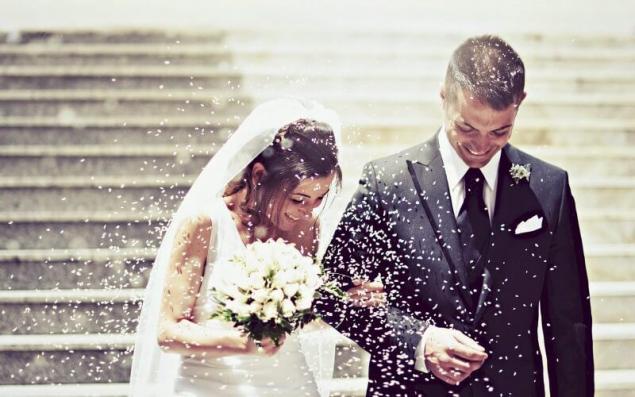834
The legal marriage? But why do you need this?
Question strange, is not it? It would seem that until now most people is their future without prospects of marriage. But in fact it turns out that the views are not so unequivocal.
Months after his engagement, I spent a fascinating pastime for: to gather a collection of opinions and reactions, which received the news of my imminent marriage
. Often had to get up in a defensive position to justify their desire to officially register the relationship. Because I often heard the following: "I, of course, happy for you, but why do it? It's just a formality, an unnecessary ritual. " "Marriage requires, and I do not feel obliged, desire and love just die." "Marriage - a government intervention in my life, this procedure is devoid of meaning, the way of control." "Marriage - a restriction of freedom." "It's family pressed on you, huh?»
At some point, this caused a great research interest in me, and I decided to consider the point of view voiced closely. Where did they all come from?

What is the essence of global change the institution of marriage and family, which began in the mid-twentieth century and is actively still going on? American writer Elizabeth Gilbert collected in the book "legally married" his observations and reflections on marriage traditions of different peoples, marriage in the past centuries and now, and on the status of married and unmarried women. The general thesis is simple: the main difference between the institution of marriage today is that we are for the first time in history we live in a time when most people are able to marry for love, and on the basis of its internal decision
. Nota bene: By love is meant not mad passion, and not some kind of an overwhelming feeling that risked passing. In general, love in its romantic meaning that we cultivate in Hollywood melodrama, to marriage does not really need, and sometimes even harmful. After all, the idealistic notion that life together is a solid harmony without disputes and crises, is divided on the reality and brings only disappointment and resentment.
In the past (and in some cultures, and to this day) the marriage was often inevitable, regardless of the desires of the individual. For the poor strata of society it was a means of survival - together to cope with the difficulties objectively easier. For the nobility, the merchants and the like marriage was a means to strengthen the political or financial position. Not to mention the fact that for a woman of the past had almost no choice but to become a wife and mother, or her position in society became altogether deplorable and powerless.
Now the progress reached so far that each of us can quite comfortably and live alone without damage to health. Hardly anyone else seriously thinks that marriage is necessary to provide support in their old age. The proverbial glass of water on his deathbed is no longer an argument. Especially when it comes to life in a big city. Marriage is no longer needed and to ensure economic security. And the role of marriage to denote social status declines. In short, in today's world, we have the luxury of opportunity to marry for the reason that we believe it is necessary for himself and correct.
However, it is considered argument unconvincing.
"If you love each other, then why all these conventions? Why not just live together? "- Waiting for you a tricky question from the opponents of marriage. Moreover, sometimes marriage is perceived as a "manifestation of mistrust." It's like two people know they will be together for life, but just in case, "tied" to each other to itself using bureaucratic and moral obligations. People ask me: if you really love links, and you plan to live together happily ever after, then why "hedge" with the official registration of the union
So, if you want - you do not want and have to really explain why two non-conservative, moderately religious, independent in all senses of the young man did not think marriage is nonsense and seriously decided to get married (and even get married in church). This is a big plus: it is always useful to once again break it down for myself. Ask an inner voice: "Really, what is it?" - And after some thought, to find the answer:
- No, you're wrong, marriage - it is not something "external" imaginary. On the contrary, it is a decision that is born within a pair and proceeds from the inner urge. It is much more than just a declaration of yourself and the world: we have decided to be together, to love and respect each other "until death do us part." This is more than announce that from now on all your intentions and plans will go to the agreement that is now what is good for couples, there will always be more important than what is good for only one of them. Marriage makes two separate people into a single body - "and the two shall become one flesh ', combines the spouses almost sacred bond. Two people in a marriage help and support each other, for each other a protective wall so that they are able to be implemented and to fulfill its mission to the world and God.
In addition to the formalities, the marriage certificate, cake cutting and cries of "Kiss!" Marry contains a spiritual component. Promises and vows to be together no need for complacency - "Oh, now he \ she will not go away from me." They need you to pronouncing them, because you are taking on a commitment to love each other and take care of him "in all the days of his life." You are aware that this promise will not be able to cancel or adjust if something goes wrong. And that's the beauty of marriage - in the most important promise that of course, and can not be canceled
. At least it should be.

But, unfortunately, the very thought of it many seem unbearable. "I have a boyfriend, and I love it, but I do not want to get married, because I think that in the future meet someone better," - says the friend. "Why are you going to get married, you will then not be able to get a divorce!" - Surprised the other
. Self-sufficient, independent people, ready for any challenges in life, one after another, baffled by the prospect of losing choice. This problem is a situation where yesterday's nonconformity became conformism: the struggle for the universal freedom of choice is not passed in vain, but on the road everyone has forgotten that freedom of choice is valuable when the selection is still performed. Failure to choose and decide, permanently in a state of perpetual waiting "something interesting" - it's still not quite free, but rather passive. And, of course, fear of mistakes - fear to lose, receive less of something, lose some opportunities (even if they are not very used)
. These fluctuations and the avoidance of the final (or even intermediate, but the end of a certain stage) selection are reflected not only in matters of relationships and family. This applies, for example, to self-identification. Fewer and fewer people are able to identify themselves clearly. To the question "who are you?" Should be the answer, "I'm too multifaceted personality to designate themselves through one thing." If 18-20 years - is the search for self and fitting different social roles, then in adulthood - it can turn into a real crisis
. Another interesting fact is that the attitude towards marriage - the question for many painful enough, otherwise it would not cause such a sharp reaction. Absolutely fine, if a person decides for himself that he did not want marriage, not interesting, and all his other plans. However, the total rejection of marriage as an institution and a belief in its "severity" for all the talk about personal pain in humans in this area.
Someone may injury because of his parents' divorce. There are some people who do not know a single example of a strong marriage among relatives and friends, and therefore make sure that the marriage - only fiction. But the question is, which came first - a superficial attitude to marriage, which eventually led to the soaring divorce rate statistics, or a deep family crisis, which led to the devaluation of the concept
. Many of the arguments of the opponents of marriage based on the negative associations and stereotypes of the past. For example, a woman says that really wants a monogamous relationship for life, but totally against the marriage as "married man relaxes and begins to feel his permissiveness, because it is believed that a woman will do anything for the sake of family preservation and can endure».
But first, the same may occur in any stable relationship. Secondly, what is the meaning to be with a man who, in your opinion, in principle, capable of such a transformation at change of social status? In general, the point here is obviously not married as such, but it is the marriage somehow demonized.
It seems to me that the time has come to re-evaluate some of the concepts. Time of total revolt against the old traditions bore fruit, among which there are a lot of positive changes. Maybe it's time to lay down their arms and look in a new way on the rejected values which today are often rejected "by inertia"? The world today allows us to select and build their lives the way we want, and we consider it necessary. So it is with marriage - it is no longer imposed by the need for, and a personal decision, filled with the sense that we ourselves put into it
. For example, a love that should lie at its heart.
Author: Ekaterina Kuznetsova
Months after his engagement, I spent a fascinating pastime for: to gather a collection of opinions and reactions, which received the news of my imminent marriage
. Often had to get up in a defensive position to justify their desire to officially register the relationship. Because I often heard the following: "I, of course, happy for you, but why do it? It's just a formality, an unnecessary ritual. " "Marriage requires, and I do not feel obliged, desire and love just die." "Marriage - a government intervention in my life, this procedure is devoid of meaning, the way of control." "Marriage - a restriction of freedom." "It's family pressed on you, huh?»
At some point, this caused a great research interest in me, and I decided to consider the point of view voiced closely. Where did they all come from?

What is the essence of global change the institution of marriage and family, which began in the mid-twentieth century and is actively still going on? American writer Elizabeth Gilbert collected in the book "legally married" his observations and reflections on marriage traditions of different peoples, marriage in the past centuries and now, and on the status of married and unmarried women. The general thesis is simple: the main difference between the institution of marriage today is that we are for the first time in history we live in a time when most people are able to marry for love, and on the basis of its internal decision
. Nota bene: By love is meant not mad passion, and not some kind of an overwhelming feeling that risked passing. In general, love in its romantic meaning that we cultivate in Hollywood melodrama, to marriage does not really need, and sometimes even harmful. After all, the idealistic notion that life together is a solid harmony without disputes and crises, is divided on the reality and brings only disappointment and resentment.
In the past (and in some cultures, and to this day) the marriage was often inevitable, regardless of the desires of the individual. For the poor strata of society it was a means of survival - together to cope with the difficulties objectively easier. For the nobility, the merchants and the like marriage was a means to strengthen the political or financial position. Not to mention the fact that for a woman of the past had almost no choice but to become a wife and mother, or her position in society became altogether deplorable and powerless.
Now the progress reached so far that each of us can quite comfortably and live alone without damage to health. Hardly anyone else seriously thinks that marriage is necessary to provide support in their old age. The proverbial glass of water on his deathbed is no longer an argument. Especially when it comes to life in a big city. Marriage is no longer needed and to ensure economic security. And the role of marriage to denote social status declines. In short, in today's world, we have the luxury of opportunity to marry for the reason that we believe it is necessary for himself and correct.
However, it is considered argument unconvincing.
"If you love each other, then why all these conventions? Why not just live together? "- Waiting for you a tricky question from the opponents of marriage. Moreover, sometimes marriage is perceived as a "manifestation of mistrust." It's like two people know they will be together for life, but just in case, "tied" to each other to itself using bureaucratic and moral obligations. People ask me: if you really love links, and you plan to live together happily ever after, then why "hedge" with the official registration of the union
So, if you want - you do not want and have to really explain why two non-conservative, moderately religious, independent in all senses of the young man did not think marriage is nonsense and seriously decided to get married (and even get married in church). This is a big plus: it is always useful to once again break it down for myself. Ask an inner voice: "Really, what is it?" - And after some thought, to find the answer:
- No, you're wrong, marriage - it is not something "external" imaginary. On the contrary, it is a decision that is born within a pair and proceeds from the inner urge. It is much more than just a declaration of yourself and the world: we have decided to be together, to love and respect each other "until death do us part." This is more than announce that from now on all your intentions and plans will go to the agreement that is now what is good for couples, there will always be more important than what is good for only one of them. Marriage makes two separate people into a single body - "and the two shall become one flesh ', combines the spouses almost sacred bond. Two people in a marriage help and support each other, for each other a protective wall so that they are able to be implemented and to fulfill its mission to the world and God.
In addition to the formalities, the marriage certificate, cake cutting and cries of "Kiss!" Marry contains a spiritual component. Promises and vows to be together no need for complacency - "Oh, now he \ she will not go away from me." They need you to pronouncing them, because you are taking on a commitment to love each other and take care of him "in all the days of his life." You are aware that this promise will not be able to cancel or adjust if something goes wrong. And that's the beauty of marriage - in the most important promise that of course, and can not be canceled
. At least it should be.

But, unfortunately, the very thought of it many seem unbearable. "I have a boyfriend, and I love it, but I do not want to get married, because I think that in the future meet someone better," - says the friend. "Why are you going to get married, you will then not be able to get a divorce!" - Surprised the other
. Self-sufficient, independent people, ready for any challenges in life, one after another, baffled by the prospect of losing choice. This problem is a situation where yesterday's nonconformity became conformism: the struggle for the universal freedom of choice is not passed in vain, but on the road everyone has forgotten that freedom of choice is valuable when the selection is still performed. Failure to choose and decide, permanently in a state of perpetual waiting "something interesting" - it's still not quite free, but rather passive. And, of course, fear of mistakes - fear to lose, receive less of something, lose some opportunities (even if they are not very used)
. These fluctuations and the avoidance of the final (or even intermediate, but the end of a certain stage) selection are reflected not only in matters of relationships and family. This applies, for example, to self-identification. Fewer and fewer people are able to identify themselves clearly. To the question "who are you?" Should be the answer, "I'm too multifaceted personality to designate themselves through one thing." If 18-20 years - is the search for self and fitting different social roles, then in adulthood - it can turn into a real crisis
. Another interesting fact is that the attitude towards marriage - the question for many painful enough, otherwise it would not cause such a sharp reaction. Absolutely fine, if a person decides for himself that he did not want marriage, not interesting, and all his other plans. However, the total rejection of marriage as an institution and a belief in its "severity" for all the talk about personal pain in humans in this area.
Someone may injury because of his parents' divorce. There are some people who do not know a single example of a strong marriage among relatives and friends, and therefore make sure that the marriage - only fiction. But the question is, which came first - a superficial attitude to marriage, which eventually led to the soaring divorce rate statistics, or a deep family crisis, which led to the devaluation of the concept
. Many of the arguments of the opponents of marriage based on the negative associations and stereotypes of the past. For example, a woman says that really wants a monogamous relationship for life, but totally against the marriage as "married man relaxes and begins to feel his permissiveness, because it is believed that a woman will do anything for the sake of family preservation and can endure».
But first, the same may occur in any stable relationship. Secondly, what is the meaning to be with a man who, in your opinion, in principle, capable of such a transformation at change of social status? In general, the point here is obviously not married as such, but it is the marriage somehow demonized.
It seems to me that the time has come to re-evaluate some of the concepts. Time of total revolt against the old traditions bore fruit, among which there are a lot of positive changes. Maybe it's time to lay down their arms and look in a new way on the rejected values which today are often rejected "by inertia"? The world today allows us to select and build their lives the way we want, and we consider it necessary. So it is with marriage - it is no longer imposed by the need for, and a personal decision, filled with the sense that we ourselves put into it
. For example, a love that should lie at its heart.
Author: Ekaterina Kuznetsova
10 best books of business that everybody should read
Understand teenager language: what music to listen to your children?























